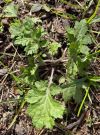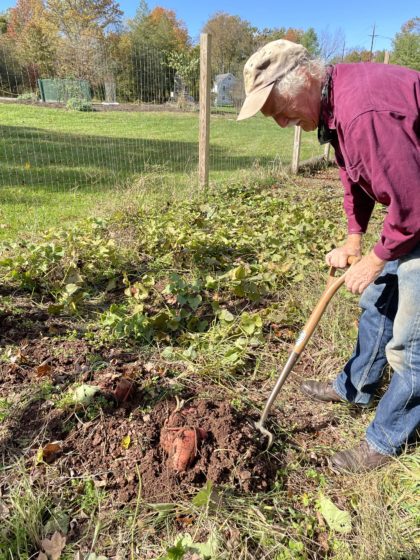By Barbara Drew, Cochair Earth Ministry
Who among us has contemplated that axiom “No Good Deed Goes Unpunished,” perhaps like me with some puzzlement due to the double negative and the irony of it all? I certainly have since we, as UUs are taught to be of service to others and strive to change the world! The phrase has been on my mind this fall as I spent many mornings caring for the native plantings made possible by two grants while also digging up the beautiful purple, yellow and white Iris that had been transplanted from the front gardens by the entrance to the parking berms, for safe-keeping. Along with these Iris, little did we know that the highly aggressive weed “Mugwort” was hiding, embedded in the Iris rhizomes.
When transplanted to the loose, sandy soil of the parking berm two years ago, unimpeded by any other plantings, the Mugwort, with its network of runner roots, took off and spread – you might say it had a field day in the open soil! To rescue the Iris and attempt to eradicate the Mugwort in what I now call the “Garden of Weeden,” many hours were spent saving the Iris and disposing of the network of runner roots (roots that grow laterally as opposed to a long taproot like a carrot). Working in late summer and early fall, the Mugwort was cut back before it had a chance to go to seed and then the plants and roots were dug out and separated from the Iris rhizomes. Repeated weeding has been necessary to remove any remnants of the runner roots, which can look like a mass of spaghetti!
Mugwort, Artemisia vulgaris, also known as Common Wormwood or Chrysanthemum Weed, is a perennial plant native to Europe and parts of Asia and Africa. (It is related to Artemisia, Dusty Miller.) Historically, it has medicinal uses in many parts of the world. If I were to design a sturdy plant, I think Mugwort would be a “good” example: have roots that spread out like spokes of wheel to the sides as well as deep; if the roots break, that just stimulates new growth and new leaves; if another plant is in the way, just grow under and through it; grow tall and spread seeds; look like another welcome plant (the early leaves look like Chrysanthemum). When tall and blooming (often found by the roadsides), it resembles Ragweed.
Europe and parts of Asia and Africa. (It is related to Artemisia, Dusty Miller.) Historically, it has medicinal uses in many parts of the world. If I were to design a sturdy plant, I think Mugwort would be a “good” example: have roots that spread out like spokes of wheel to the sides as well as deep; if the roots break, that just stimulates new growth and new leaves; if another plant is in the way, just grow under and through it; grow tall and spread seeds; look like another welcome plant (the early leaves look like Chrysanthemum). When tall and blooming (often found by the roadsides), it resembles Ragweed.
CAUTION: While the Grounds Committee and Earth Ministry welcome members to dig out perennials and bulbs from the gardens by the entrance and ramps, we recommend that you rinse the roots off to avoid introducing Mugwort to your garden.
On the bright side, Earth Ministry recently received another grant! Fifteen new native shrubs were donated to UUCWC’s Earth Ministry through an extension of the grant from Bowman’s Hill Wildflower Preserve (New Hope, PA). Plants include Aronia (Black and Red Chokeberry), Viburnum, Sambucus (Elderberry), Physocarpus (Ninebark) and Itea virginica (Sweetspire). All the shrubs will be planted in the parking berms to enhance wildlife habitat, attract pollinators, birds, bees and butterflies and other wildlife. Red berries will provide food for some lucky wildlife. This of course means that the local deer will be tempted to browse and scrape their antlers on the trunks and branches. Fencing to protect the plantings has been donated by former UUCWC member Sherry Dudas of Honey Brook Organic Farm and is being placed around the plants. Through a cooperative effort, mulching has been spread by our dedicated and energetic Grounds Committee Cochairs, Bodo Baltycki and Denny Rodgers. This will help to reduce the Crabgrass and Mugwort and keep in the moisture in the soil. The mulch was delivered with a discount generously contributed by Season’s Nurseries.
When you have a chance to visit the church grounds to walk the Meditation Trail, visit the Memorial Garden or drop off a Food Ministry contribution or the like, be sure to glance over at the “garden of weeden.”  Meanwhile, Allie’s Garden, our veggie garden for Food Ministry purposes has recently been harvested with a great crop of sweet potatoes! Thank you, Al Johnson!
Meanwhile, Allie’s Garden, our veggie garden for Food Ministry purposes has recently been harvested with a great crop of sweet potatoes! Thank you, Al Johnson!
Other activities for the Earth Ministry Team include preparing for a group read and discussion of Bill Gates’ book “How to Avoid Climate Disaster.” Each of the 12 chapters of the book will be discussed with different team members leading the discussion for a given chapter. The book discussion is planned via Zoom for Thursday, December 9th at 7:30 pm, and it will be open to all. The book is intended to be a catalyst for discussion and, more importantly, follow-up action. Contact earthministry@uucwc.org for more info.
